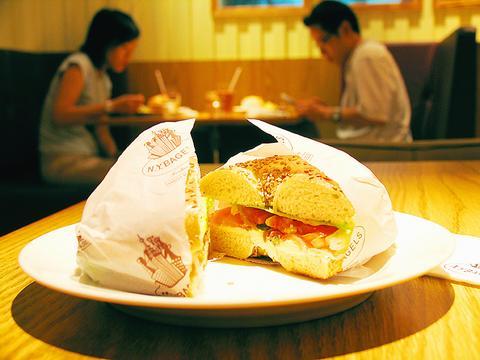Cities are judged on such criteria as infrastructure, income and education levels. But how about whether or not you can get a lox and cream cheese bagel at 4am? In opening a second shop on Renai Road, that is 24-hour, NY Bagels Cafe has given Taipei a new place for nocturnal noshing and helped the city fit into its international-sized shoes.
Located a block from the 24-hour Eslite Bookstore and a short walk from the late-night lounges lining Anhe Road, the new bagel shop is already filling tables after having been open for only two weeks.

PHOTO: DAVID MOMPHARD, TAIPEI TIMES
It's no surprise. There is a lot more on offer in the 20-page menu than just bagels. Notably, a section of gigantic sandwiches, including a delicious sirloin steak sandwich on sourdough and a "homemade" hamburger, that will likely find favor even among those who aren't bagel fans.
Other non-bagel items unique to the new store are a selection of pastas, Jack's lasagna (NT$190) or a choice of chicken, bacon or seafood spaghetti in a creamy tomato sauce (each NT$170). Here, too, you can ante-up for an optional drink and fries.
The menu is a bit annoying. Rather than simply list what's on offer, it's unnecessarily promotional and filled with newspaper clippings and ads for cream cheese and olive oil. There's even a section titled "What's a bagel?" for locals that think bread should be steamed. If they want to get creative, they would do well to look at Japanese grill Kan Pai's menu, which doubles as a monthly newsletter, with articles on everything from proper grilling techniques to local alt-rock bands. Last month's menu had illustrated instructions on how to change an electrical switch -- quirky, but it moves the conversation away from the work day.
Other suggestions: First, tack up some no smoking signs. Nothing messes with your mish more than the cigarette smoke from the guy next to you. Next, add a couple of fondues to the menu.

This is the year that the demographic crisis will begin to impact people’s lives. This will create pressures on treatment and hiring of foreigners. Regardless of whatever technological breakthroughs happen, the real value will come from digesting and productively applying existing technologies in new and creative ways. INTRODUCING BASIC SERVICES BREAKDOWNS At some point soon, we will begin to witness a breakdown in basic services. Initially, it will be limited and sporadic, but the frequency and newsworthiness of the incidents will only continue to accelerate dramatically in the coming years. Here in central Taiwan, many basic services are severely understaffed, and

Jan. 5 to Jan. 11 Of the more than 3,000km of sugar railway that once criss-crossed central and southern Taiwan, just 16.1km remain in operation today. By the time Dafydd Fell began photographing the network in earnest in 1994, it was already well past its heyday. The system had been significantly cut back, leaving behind abandoned stations, rusting rolling stock and crumbling facilities. This reduction continued during the five years of his documentation, adding urgency to his task. As passenger services had already ceased by then, Fell had to wait for the sugarcane harvest season each year, which typically ran from

It is a soulful folk song, filled with feeling and history: A love-stricken young man tells God about his hopes and dreams of happiness. Generations of Uighurs, the Turkic ethnic minority in China’s Xinjiang region, have played it at parties and weddings. But today, if they download it, play it or share it online, they risk ending up in prison. Besh pede, a popular Uighur folk ballad, is among dozens of Uighur-language songs that have been deemed “problematic” by Xinjiang authorities, according to a recording of a meeting held by police and other local officials in the historic city of Kashgar in

It’s a good thing that 2025 is over. Yes, I fully expect we will look back on the year with nostalgia, once we have experienced this year and 2027. Traditionally at New Years much discourse is devoted to discussing what happened the previous year. Let’s have a look at what didn’t happen. Many bad things did not happen. The People’s Republic of China (PRC) did not attack Taiwan. We didn’t have a massive, destructive earthquake or drought. We didn’t have a major human pandemic. No widespread unemployment or other destructive social events. Nothing serious was done about Taiwan’s swelling birth rate catastrophe.